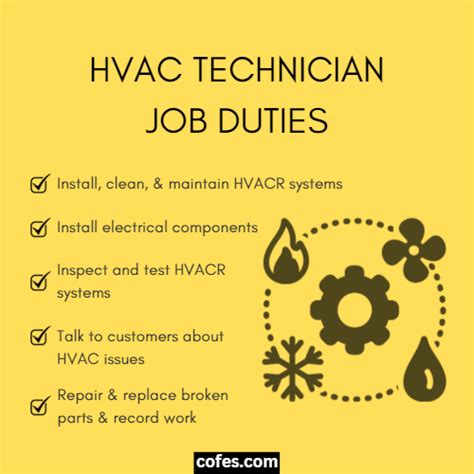The heating, ventilation, and air conditioning (HVAC) industry is a vital part of modern society, providing comfortable and healthy indoor environments for millions of people around the world. As a crucial part of this industry, HVAC technicians play a vital role in installing, maintaining, and repairing heating and cooling systems. In this article, we will delve into the world of HVAC tech duties, exploring the job description, responsibilities, and requirements of this in-demand profession.
What is an HVAC Technician?
An HVAC (heating, ventilation, and air conditioning) technician is a skilled professional responsible for the installation, maintenance, and repair of heating and cooling systems in residential, commercial, and industrial settings. These technicians work with a variety of systems, including furnaces, air conditioners, heat pumps, and ventilation systems, to ensure they operate efficiently and safely.

Key Responsibilities of an HVAC Technician
The primary duties of an HVAC technician include:
- Installing new heating and cooling systems, including ductwork and vents
- Performing routine maintenance and repairs on existing systems
- Diagnosing and troubleshooting system malfunctions
- Replacing faulty or worn-out components, such as compressors, coils, and fans
- Conducting performance tests to ensure systems operate efficiently and safely
- Providing customer service and support, including explaining system operations and maintenance requirements
Installation and Replacement Duties
HVAC technicians are responsible for installing new heating and cooling systems, which involves:
- Reading and interpreting blueprints and technical diagrams
- Measuring and marking installation sites
- Installing and connecting system components, such as ductwork, vents, and controls
- Testing systems to ensure proper operation and performance

Maintenance and Repair Duties
Regular maintenance and repairs are crucial to ensuring HVAC systems operate efficiently and safely. HVAC technicians perform routine maintenance tasks, such as:
- Cleaning and inspecting system components, including filters, coils, and fans
- Replacing worn-out or damaged components
- Adjusting and calibrating system controls and settings
- Troubleshooting system malfunctions and diagnosing problems
Diagnostic and Troubleshooting Duties
HVAC technicians use a range of tools and techniques to diagnose and troubleshoot system problems, including:
- Using specialized equipment, such as multimeters and leak detectors
- Analyzing system performance data and system logs
- Conducting visual inspections of system components and connections
- Consulting technical manuals and manufacturer documentation

Education and Training Requirements
To become an HVAC technician, you typically need to complete a post-secondary training program in HVAC technology, which can last from six months to two years. These programs are offered at vocational schools, community colleges, and technical institutes.
In addition to formal education, many HVAC technicians also complete apprenticeships or on-the-job training programs, which provide hands-on experience and exposure to the latest technologies and techniques.
Certifications and Licenses
While not always required, certifications and licenses can demonstrate a technician's expertise and commitment to the profession. Some common certifications and licenses include:
- EPA Section 608 Technician Certification
- NATE (North American Technician Excellence) Certification
- R-410A Certification
- State and local licenses, such as contractor licenses or journeyman licenses

Salary and Job Outlook
The salary and job outlook for HVAC technicians are promising, with the Bureau of Labor Statistics (BLS) predicting a 13% growth in employment opportunities from 2020 to 2030.
According to the BLS, the median annual salary for HVAC technicians was $51,840 in May 2020, with the top 10% of technicians earning over $83,000 per year.

Conclusion
In conclusion, HVAC technicians play a vital role in maintaining comfortable and healthy indoor environments. With a comprehensive job description that includes installation, maintenance, and repair duties, as well as diagnostic and troubleshooting tasks, HVAC technicians require a range of skills and knowledge.
If you're interested in pursuing a career as an HVAC technician, be sure to research education and training requirements, certifications and licenses, and salary and job outlook in your area.
We hope this article has provided valuable insights into the world of HVAC tech duties. Share your thoughts and questions in the comments below!






What is the average salary for an HVAC technician?
+The average salary for an HVAC technician is around $51,840 per year, according to the Bureau of Labor Statistics.
What kind of education and training do I need to become an HVAC technician?
+Typically, you need to complete a post-secondary training program in HVAC technology, which can last from six months to two years.
What kind of certifications and licenses do I need to become an HVAC technician?
+While not always required, certifications and licenses can demonstrate a technician's expertise and commitment to the profession. Some common certifications and licenses include EPA Section 608 Technician Certification, NATE Certification, and state and local licenses.
